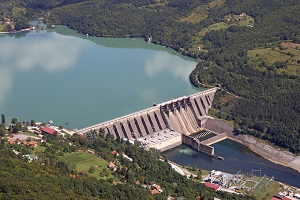Prepared by: Dr. Muhammad Najib Razali 
Water resource management is sometimes referred to as a distressing problem that defies simple solutions. It’s become a problem because there are unknown dimensions to natural resource science. Many parties have various values in the management of water resources, making decision-making complex.
A greater range of analytical lenses and a reflexive application are required to capture the core of transboundary waters’ political nature. Water allocation is particularly problematic in international transboundary river basins, with basin states claiming ownership and authority to use the waters inside their borders. Water demands frequently conflict with the state’s development goals. Basin asymmetries support or refute these arguments, resulting in a situation where water resource management produces an ‘equal’ outcome in a hydro-hegemonic state.

Transboundary water has become a global issue, not just between countries but also within states in the country. It’s not just involved in a political sense but also within economic matters. Water becomes physically scarce in certain regions and at specific times due to spatial and temporal fluctuations in precipitation. Thus, scarcity can be thought of as an economic problem with a mismatch between supply and demand.
The majority of Malaysia’s water resources are shared by several states. The transboundary nature of Malaysia’s rivers, lakes, and aquifers adds significant political, technical, environmental, and financial complexity to their long-term development, frequently resulting in stalled investments or the adoption of sub-optimal development strategies with real and significant costs. In the case of Malaysia, transboundary not just involves Malaysia with Singapore or several states such as Kedah with Penang, Selangor with Pahang, Johor with Melaka, and Perak with Penang.
The water transboundary issue in Malaysia is not as severe as in other countries such as Egypt with Sudan and Ethiopia with Sudan. The problems in these countries are due to the government’s political will to protect water for people’s use. Water resource management decisions are influenced by a variety of elements, ranging from social and economic concerns to physical restrictions, political considerations, and state and federal legislation and regulations.
Furthermore, Malaysia’s existing transboundary water is behind the coordination between the federal and state governments, as well as between states, which appears to require certain institutional frameworks. This, in turn, lays the groundwork for considering how to work with around or gradually modify current systems in order to achieve developmental policy objectives.
In Malaysia, structural and local measures are required to take immediate control of local players and build the underlying context for transboundary water. Hydrological, topographical, economic and climate considerations, all play a part in analysing such elements, as does their location on the river or basin. Institutions are the “rules of the game” that emerge from the interaction of formal and informal arrangements that govern the state, ministry, and individual behaviour. The national political-institutional environment interacts with the geopolitical-institutional environment, producing a space for transformation that is jointly shaped.
The customers of countries’ water systems often anticipate greater supply reliability, with intermittent delivery seen as an intolerable disruption of residential comfort for which they pay. As consumers sensitivity to health concerns develops, they want water quality to improve. Meeting this increasing demand presents a significant problem for utilities as they may lack the technical capabilities to enhance the operation of the technical systems that they manage.
Several political ideologies are contending for attention and translation to create specific water infrastructure, policy instruments, and governance structures in water management. A strong political ideology exists in much of the world that water is and should be considered as a public good, leading to regulations and international statements enshrining the communities’ right to water in law.
For Malaysia, water resource management is under the jurisdiction of state governments. Therefore, understanding the role of power and hegemony is crucial because it can help to explain how collaboration in the form of an intra-state agreement or a joint technical committee can allow for the existence and persistence of uncertainty about water allocation. Surface-level cooperative initiatives could be utilized to change the situation on hold rather than fix the issue fundamentally.
Power relations’ analysis gives compelling explanations on how politicians make and enforce decisions about water allocation and use, as well as why those decisions may not be equitable for all, particularly for those who rely directly on the water for their livelihoods. As a result, an explanation of transboundary water politics that focuses solely on events that indicate conflict or cooperation rather than transboundary water interactions will be unable to explain these complexities.



